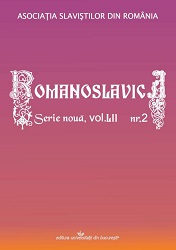Perpetuiranje rodnih stereotipa u hrvatskim rječnicima
Perpetuation of gender stereotypes in Croatian dictionaries
Author(s): Tatjana PiškovićSubject(s): Gender Studies, Lexis, Semantics, Psycholinguistics, South Slavic Languages, 18th Century, 19th Century
Published by: Editura Universităţii din Bucureşti
Keywords: grammatical gender; dictionary; lexicographic definitions; gender stereotypes; gender asymmetry;
Summary/Abstract: In animistic speculative theories about the origin of grammatical gender, which are formed in the 18th century by J. G. Herder and J. Ch. Adelung, grammatical gender is interpreted as the result of manʼs efforts to make the world around them individualized, personified, animate and sexualized. In the 19th century, Jacob Grimm develops that idea, arguing that grammatical gender is an imaginational reflection and an extension of the natural gender. Moreover, Grimm perpetuates and canonizes that problematic thesis in his grammar of German language. There are a number of grammarians of English language that explain the gender of nouns for inanimate by analogy to the numerous stereotypes about male and female physical characteristics and sexual behavior. While Croatian grammariansʼ interpretation of the grammatical category of gender has never been so profane, Croatian lexicographers enrolled many gender prejudices in their definitions of nouns for women. Based on the lexicographic definition of nouns for women and men, the paper will point out how the Croatian dictionaries produce, perpetuate and authorize gender stereotypes.
Journal: Romanoslavica
- Issue Year: LII/2016
- Issue No: 2
- Page Range: 343-363
- Page Count: 21
- Language: Croatian

